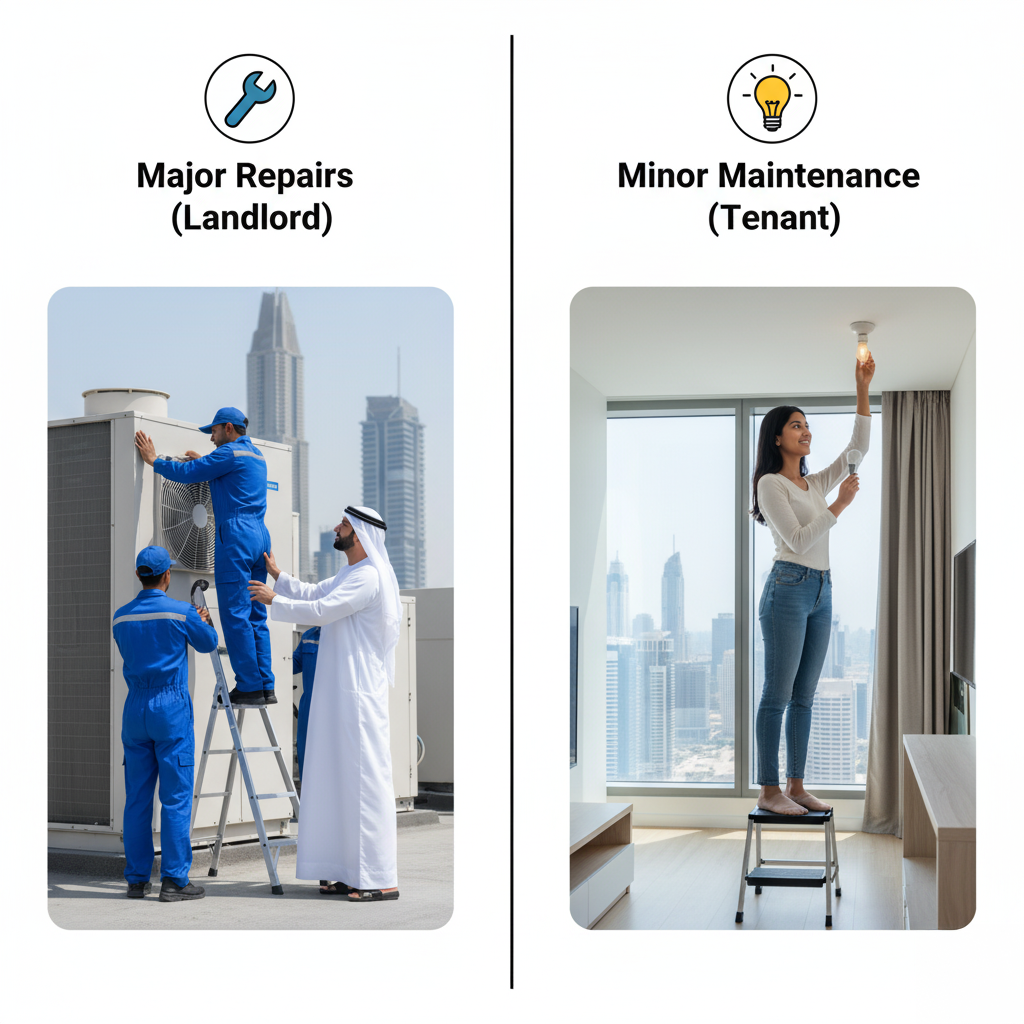Navigating the rental market in a bustling city like Dubai can feel overwhelming. The excitement of finding a new home is often followed by anxiety over complex tenancy contracts, unexpected rent hikes, and uncertainty about your rights. If you’ve ever felt confused by legal jargon or worried about a dispute with your landlord, you are not alone. But here’s the good news: Dubai has a robust legal framework designed to protect you and your tenant rights in the UAE.
This guide is more than just a list of rules; it’s your definitive, actionable toolkit. We will transform you from a confused renter into an empowered tenant. We’ll walk you through the legal foundation of your rights, show you exactly how to challenge an unfair rent increase, clarify who is responsible for maintenance, and provide a step-by-step plan for navigating the Rental Dispute Centre (RDC) with confidence. It’s time to master your rights and rent with peace of mind.
The Foundation of Your Rights: Understanding Dubai’s Tenancy Law & Ejari
Before you can address any specific issue, you must understand the legal bedrock that secures your rights as a tenant in Dubai. This foundation is built on two key elements: the governing law and the mandatory registration of your tenancy contract.
The primary law that regulates the relationship between landlords and tenants is Law No. 26 of 2007, as amended by Law No. 33 of 2008. This legislation outlines the core obligations of both parties, from maintenance responsibilities to eviction procedures. It is the single most important document shaping tenant protection in the emirate.
However, for this law to protect you, your tenancy contract must be officially registered through the Ejari system. Ejari, which means “my rent” in Arabic, is a mandatory online registration system operated by the Real Estate Regulatory Agency (RERA). Registering your contract with Ejari makes it a legally binding document recognized by all Dubai government authorities. Without an Ejari registration, you cannot file a formal complaint or have your rights legally enforced by the Rental Dispute Centre.
Why Ejari is Non-Negotiable:
- Legal Recognition: It is the official record of your tenancy, making your contract legally enforceable.
- Dispute Resolution: An Ejari certificate is a mandatory document required to file any rental dispute with the RDC.
- Utility Connections: It is required to set up your DEWA (Dubai Electricity and Water Authority) account.
- Transparency: It creates a transparent and official record of the agreed-upon rent, preventing unauthorized changes.
For more information on the registration process, you can visit the official Ejari Tenancy Contract Registration page.

Decoding Rent Increases: How to Use the RERA Index and Challenge Unfair Hikes
One of the most common sources of stress for tenants is an unexpected or seemingly unfair rent increase. Fortunately, Dubai has a clear and transparent system to regulate this. Any rent hike must comply with the guidelines set by RERA, and landlords cannot arbitrarily increase your rent.
First and foremost, a landlord must provide you with a written notice of any rent increase at least 90 days before your tenancy contract is due to expire. If this notice is not given, or is given late, the landlord legally loses the right to increase the rent for the upcoming renewal period.
What is the Maximum Rent Increase Allowed in Dubai?
The maximum permissible rent increase is not a flat rate. It is determined by comparing your current rent to the average market rent for similar properties in your area, as calculated by the RERA Rental Index. The rules, established by Decree No. (43) of 2013, are structured in tiers.
Here is a clear breakdown of the maximum legal rent increase:
| If Your Current Rent Is… | Maximum Legal Increase |
|---|---|
| Less than 10% below the market average | 0% (No increase allowed) |
| 11% to 20% below the market average | 5% |
| 21% to 30% below the market average | 10% |
| 31% to 40% below the market average | 15% |
| More than 40% below the market average | 20% |
To find out the average market rent for your property and verify if a proposed increase is legal, you must use the Official RERA Rental Index Calculator. This official tool is your most powerful asset in any rent negotiation.
Your Action Plan for an Unfair Rent Increase
If your landlord has proposed a rent increase that exceeds the legal limit calculated by the RERA index, you have the right to refuse it. Follow this simple, three-step action plan:
- Step 1: Verify with the RERA Calculator
Use the official RERA Rental Index calculator to determine the maximum increase allowed for your property. Take a screenshot of the result as evidence. - Step 2: Communicate Formally with Your Landlord
Do not agree to the increase verbally. Send a formal email or written letter to your landlord or their agent, politely rejecting the proposed increase. State that it is not in line with the RERA Rental Index and attach the screenshot of your calculation as proof. - Step 3: Escalate to the Rental Dispute Centre (RDC)
If your landlord refuses to comply and insists on the illegal increase, do not feel pressured. You can continue paying your current rent and, if necessary, file a case with the Rental Dispute Centre (RDC) to have the new contract terms decided by a judge.

Sample Email Template to Reject an Unfair Rent Increase
Subject: Re: Tenancy Contract Renewal & Rent Increase for [Your Property Address]
Dear [Landlord’s Name/Property Manager’s Name],
Thank you for your notice regarding the renewal of my tenancy contract for the property at [Your Full Address], which is due to expire on [Contract Expiry Date].
I am writing in response to the proposed rent increase from AED [Current Rent] to AED [Proposed Rent].
I have reviewed the proposed increase using the official RERA Rental Index provided by the Dubai Land Department. According to the calculator, the maximum permissible rent increase for my property is [X%], which would amount to a new rent of AED [Calculated Legal Rent]. The proposed rent of AED [Proposed Rent] is above this legal limit.
A copy of the RERA Rental Index calculation is attached for your reference.
I am happy to renew the tenancy contract at the legally permissible rent of AED [Calculated Legal Rent]. Please let me know if you would like to proceed with the renewal on these terms.
Thank you for your understanding.
Sincerely,
[Your Name]
[Apartment/Villa Number]
[Contact Number]
For more information on the legal framework, you can review the Dubai Tenancy Law No. (26) of 2007.
Maintenance & Repairs: A Clear Guide to Landlord Responsibilities
Disputes over maintenance are another frequent source of friction. Who is responsible for a broken air conditioner or a leaking pipe? The law is clear on this matter.
Article 16 of Law No. 26 of 2007 states that the landlord is responsible for handling all major maintenance and repair works of the property during the tenancy period, unless otherwise agreed. This means your landlord is obligated to fix any issue that prevents you from fully using and enjoying the property.
While tenancy contracts often specify that tenants are responsible for “minor” maintenance, the line can sometimes be blurry. A common practice in many Dubai contracts is to define this with a cost threshold, often setting AED 500 as the dividing line. Any repair costing more than this amount is typically considered “major” and falls to the landlord.
Who’s Responsible? A Quick Guide
| Issue | Typically Landlord’s Responsibility (Major) | Typically Tenant’s Responsibility (Minor) |
|---|---|---|
| AC Unit Failure | ✔️ | |
| Major Plumbing Leaks | ✔️ | |
| Electrical System Faults | ✔️ | |
| Structural Repairs | ✔️ | |
| Water Heater Malfunction | ✔️ | |
| Routine Cleaning | ✔️ | |
| Replacing Light Bulbs | ✔️ | |
| Minor Dripping Faucet | ✔️ | |
| Normal Wear and Tear | ✔️ |
If you face a major maintenance issue, notify your landlord immediately in writing. If they fail to respond or carry out the necessary repairs, you can file a complaint with the RDC.

Sample Formal Maintenance Request Template
Subject: URGENT Maintenance Request: [Specify Issue] at [Your Property Address]
Dear [Landlord’s Name/Property Manager’s Name],
This is a formal request for maintenance at my rented property located at [Your Full Address].
I am experiencing the following issue: [Clearly and concisely describe the problem. For example, “The air conditioning unit in the master bedroom is not cooling,” or “There is a significant water leak under the kitchen sink.”]
This issue was first noticed on [Date]. As this affects the habitability of the property, I request that you arrange for the necessary repairs as soon as possible, in accordance with your obligations under Article 16 of Dubai’s Tenancy Law.
Please let me know within 24-48 hours when a technician can be scheduled to visit the property. I can be reached at [Your Phone Number] to coordinate access.
Thank you for your prompt attention to this matter.
Sincerely,
[Your Name]
[Apartment/Villa Number]
Eviction Rules in Dubai: Know Your Powerful Protections
The thought of eviction can be terrifying for any tenant. However, Dubai’s rental law provides powerful protections against arbitrary eviction. A landlord cannot simply ask you to leave because they found a tenant willing to pay more or for any reason not explicitly permitted by law.
For a landlord to evict a tenant upon the expiry of a tenancy contract, they must have one of a few legally valid reasons and provide 12 months’ written notice, delivered through a Notary Public or by registered mail.
According to Law No. 33 of 2008, the valid reasons for eviction at contract expiry are limited to:
- The owner wishes to demolish or reconstruct the property.
- The property requires significant maintenance or renovation that cannot be done while the tenant is living there.
- The owner wishes to sell the property.
- The owner wishes to move into the property for their personal use (or for use by a first-degree relative), provided they do not own another suitable property.
Valid vs. Invalid Eviction Notice: A Quick Comparison
| Feature | Valid Eviction Notice | Invalid Eviction Notice |
|---|---|---|
| Notice Period | 12 months before contract expiry | Less than 12 months’ notice |
| Delivery Method | Notary Public or Registered Mail | Email, WhatsApp message, or verbal notice |
| Reason Given | One of the four legally valid reasons | “I want to increase the rent,” “I found another tenant,” or no reason given |
If you receive an eviction notice that does not meet these strict legal requirements, it is considered invalid, and you are not obligated to vacate the property. The law also considers practical factors like family stability and children’s schooling, ensuring the process is fair.

Your Step-by-Step Guide to the Rental Dispute Centre (RDC)
When communication with your landlord breaks down and you cannot resolve an issue amicably, your next step is the Rental Dispute Centre (RDC). This is the judicial arm of the Dubai Land Department, created specifically to handle landlord-tenant disputes efficiently and fairly.
As Dr. Omar Bin Suwaidan Al Suwaidi, a Senior Judge at the RDC, has noted, the center’s services are now almost entirely online, making the process fast, transparent, and accessible. Don’t be intimidated by the legal process; the RDC is designed to be user-friendly. For official information, you can visit Dubai’s Rental Disputes Center (RDC).
Here is a breakdown of the entire journey, from filing a complaint to receiving a judgment.
The RDC Dispute Journey: A Flowchart
- Filing the Complaint: You submit your case and all required documents online.
- Mediation/Reconciliation: The RDC may first attempt to help you and your landlord reach an amicable settlement.
- First Instance Hearing: If mediation fails, your case is heard by a judge who issues a preliminary judgment. Hearings can often be attended remotely.
- Appeal (if applicable): For claims over a certain value, either party can appeal the first judgment.
- Enforcement: Once a final judgment is issued, the RDC’s enforcement department ensures the ruling is carried out.
Before You File: Required Documents and Fees
Preparation is key to a smooth process. Before you start your online application, gather the following documents:
- Your Emirates ID and Passport/Visa Copy
- Landlord’s Emirates ID and Passport Copy (if available)
- Ejari Certificate (mandatory)
- Original Tenancy Contract
- Recent DEWA Bill
- Title Deed of the Property
- Proof of Communication: Copies of any emails, letters, or formal notices exchanged with the landlord regarding the dispute.
- Any other supporting evidence (e.g., photos of maintenance issues, RERA calculator screenshot).
Fees: The main filing fee is 3.5% of your annual rent. This has a minimum charge of AED 500 and is capped at a maximum of AED 20,000.
How to File Your Complaint Online: A Walkthrough
Filing a complaint is done through the official RDC portal on the Dubai Land Department website. While the interface may be updated, the general steps are as follows:
- Visit the RDC Portal: Navigate to the official Rental Disputes Center page on the DLD website.
- Create an Account: You will need to register for an account if you don’t already have one.
- Start a New “Dispute Lawsuit”: Select the option to file a new case.
- Enter Applicant & Respondent Details: Fill in your information (the applicant) and your landlord’s information (the respondent).
- Upload Your Documents: Scan and upload all the required documents from the checklist above. Ensure the scans are clear and legible.
- Write Your Claim: Clearly and concisely explain the nature of your dispute and what resolution you are seeking from the court. Be factual and stick to the point.
- Pay the Fees: Pay the calculated filing fees online through the secure payment gateway.
- Submit and Track: Once submitted, you will receive a case number. You can use this to track the status of your case online.

What to Expect After You File: The RDC Process Explained
After filing, the RDC will typically schedule the first hearing within a few days or weeks. The RDC aims to resolve most cases within 30 days. You will be notified of the hearing date and time.
Many hearings are now conducted remotely, making it convenient for all parties. Dubai’s RDC is even pioneering innovative solutions like litigation sessions in the Metaverse, demonstrating its commitment to modern, accessible justice. Once a judgment is issued, it is legally binding. If the other party fails to comply (e.g., return a deposit or cancel an illegal rent hike), you can open an execution file with the RDC to have the judgment enforced.
Frequently Asked Questions (FAQ) about Tenant Rights in Dubai
Can my landlord enter my apartment without permission?
No. You have a right to quiet enjoyment of your property. While a landlord may need access for maintenance or viewings, they must provide reasonable notice, typically 24 hours in advance, unless it is an absolute emergency like a fire or major flood. This is a fundamental right protected under the principles of your tenancy contract.
What happens to my security deposit?
A landlord is legally required to return your security deposit at the end of the tenancy. They can only make deductions to cover the cost of repairing damages to the property that go beyond normal wear and tear. They cannot deduct for things like repainting after several years of tenancy. To protect yourself, always take detailed photos and videos of the property’s condition when you move in and when you move out. If a landlord unfairly withholds your deposit, you can file a case with the RDC to claim it back.
Do I have the right to automatically renew my lease?
Yes, in a way. If your contract is ending and neither you nor your landlord has given notice to terminate or change the terms of the contract at least 90 days before expiry, the contract is considered to be automatically renewed on the same terms and conditions for a similar period (up to one year).

Conclusion: From Anxious Renter to Empowered Tenant
Renting in Dubai doesn’t have to be a source of stress. The law provides you with strong, clearly defined rights that protect you from unfair rent hikes, neglected maintenance, and illegal evictions. The key to a secure and peaceful tenancy lies in understanding these rights and knowing how to act on them.
By using the official RERA Rental Index, communicating formally with your landlord, and understanding the accessible process of the Rental Dispute Centre, you can shift from a position of uncertainty to one of empowerment. You have the tools and the legal backing to ensure your tenancy is fair and just.
Bookmark this guide as your go-to resource for any rental questions in Dubai. Share it with fellow renters to help them become empowered tenants too.
This article provides general information and is not a substitute for professional legal advice. Consult with a qualified legal professional for your specific situation.
Official Sources & References
- Dubai Land Department. (2007). Law No. (26) of 2007 Regulating the Relationship between Landlords and Tenants in the Emirate of Dubai (as amended by Law No. 33 of 2008). Retrieved from https://dubailand.gov.ae/media/c0y5b30b/law-no-26-of-2007.pdf
- The Government of Dubai. (2013). Decree No. (43) of 2013 Concerning the Percentages of Rent Increase for Properties in the Emirate of Dubai.
- Gulf News. (2024). Dubai judge reveals key tenant rights on rent, eviction and maintenance. Retrieved from https://gulfnews.com/uae/dubai-judge-reveals-key-tenant-rights-on-rent-eviction-and-maintenance-1.500327297, quoting Dr. Omar Bin Suwaidan Al Suwaidi.
- Dubai Land Department. (n.d.). About Rental Disputes Center. Retrieved from https://dubailand.gov.ae/en/rdc/about-rdc/#/
- Dubai Land Department. (n.d.). Rental Index. Retrieved from https://dubailand.gov.ae/en/eservices/rental-index/



